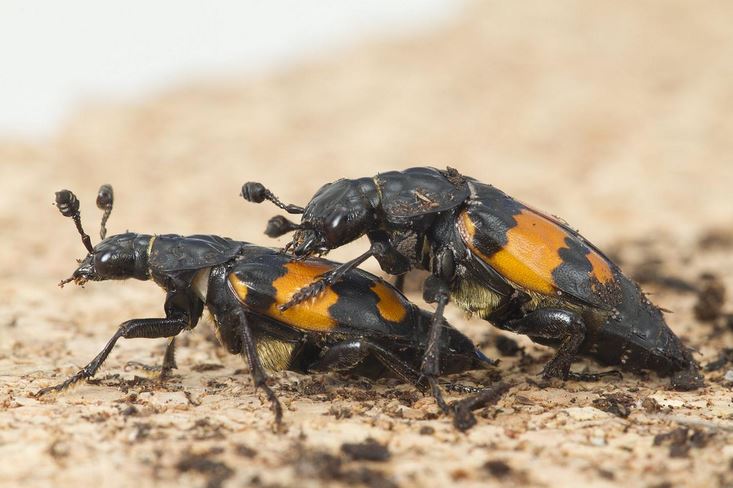Very sexually active male beetles tend to be more insecure about where they stand in the social pecking order compared to their less sexually active peers, researchers from the University of Exeter in England reported in the academic journal Evolution.
This latest study on burying beetles provides new evidence that frequency of mating is linked to social sensitivity, the authors claim.
Male burying beetles will compete actively with each other for access to food, which they then use to lure females. If, for example, one gains access to a dead mouse, it will emit pheromones as a signal to attract females.

Social sensitivity of male behavior is linked to how often male beetles mate. (Image Credit: Jena Johnson)
Other males also sense the emission of pheromones and come along, competing for the food and subsequent female mate. In the beetle world, as far as winning against rivals is concerned, size is king – the bigger beetle tends to win out.
Consequently, the dominant male and female pair, which the researchers call “resource holders”, are usually established. They process the dead mouse and use it to raise their young.
Subordinate beetles use other tactics
Non-resource holding males and females can adopt different strategies to improve their probability of reproducing successfully.
Subordinate females may opt to lay their eggs near carcasses, while subordinate males may grab sneak copulations with females. Females mating with several males creates uncertainty over paternity.
Dr. Nick Royle, who works at the University of Exeter’s Centre for Ecology and Conservation, said:
“What is really fascinating is that this social sensitivity has evolved in response to selection on mating behaviour: males that have more sex really are more insecure about their social status. Our results therefore provide valuable insights as to how behavioural plasticity evolves.”
The scientists artificially selected burying beetles for either low or high mating rates. A high mating rate offers paternity protection, i.e. the likelihood of your being the father is higher the more you mate.
The team members found that beetles selected to mate at a high rate were more sensitive to how much bigger or smaller they were than rival males when they were a resource-holder, compared to males selected for low mating rate – “rapidly ramping up dominant behaviour when larger, but scaling down dominant behaviour when smaller, than their rival.”
How organisms adapt to change
As evolutionary biologist, Dr. Mauricio Carter Montecinos, explained:
“Such flexibility of behaviour in response to a change in social context is a common, but relatively poorly understood, feature of organisms. Plasticity of behaviour is important because it allows organisms to respond rapidly to changes, increasing the persistence of populations in the face of environmental fluctuations.”
“Our research increases our understanding of this important process that helps organisms adapt to changes in their environment.”
Citation: “Behavioral plasticity and GxE of reproductive tactics in Nicrophorus vespilloides burying beetles,” Mauricio Carter, Megan Head, Allen Moore and Nick Royle. Evolution. DOI: 10.1111/evo.12619.

